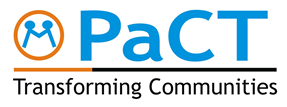Program overview
In Uganda access to safe water is still a major challenge with only 68% of the population accessing safe and clean water. According to the Uganda Ministry of Water and Environment (2016), access to safe water is estimated at 31% in Mubende 68% District Mityana, 71% Kiboga, 48% Kyankwanzi and 81% in Ggomba District (Uganda Water Atlas). With such a huge challenge regarding access to safe and clean water in the Mubende region, PaCT and her development partners have focused on engaging communities to gain meaningful access to safe and clean water while at the same time improve their the hygiene and sanitation outcomes.
PaCT establishes Water Management Committees and are trained together with Community Hygiene Promoters to take lead in site construction and ensure continued sustainable management of the constructed water points. Community volunteers have also taken lead in monitoring the general hygiene and sanitation of the entire communities where our projects are being implemented. PaCT focuses largely on water points that benefit a large population of people and these include boreholes, spring protection, hand-dug wells and rain water harvest systems on public institutions. Water is often tested by the district laboratories before its pronounced safe for human consumption.
All communities supported with the development of water points are encouraged to establish a maintaince fund which is contributed to by every household that benefits from the water point. This has always helped the communities to repair their wells in case they break down, thus ensuring meaningful sustainability.
Area of coverage
Community Support
Women and children tread miles, hours each day, an estimated 842,000 people die each year due to diarrheal disease that could have been prevented by WASH interventions; 361,000 are children under the age of five years old. Half of global malnutrition and one quarter of stunting in children are due to waterborne related diseases like chronic diarrhea and intestinal worms, and diarrhea is responsible for 17% of global disability (PMNCH, 2014).
You can join us to end water related challenges in Uganda by choosing to celebrate your memorable day by supporting to create a smile on faces of the unprivileged societies in Uganda. You can choose to donate a well, water tank, water filter or construct a pit-latrine to benefit over 500 school children.
Wells

The main water access points in PaCT’s area of operation are unprotected spring wells, hand dug wells and boreholes. However, although water running through spring wells is naturally provided, it’s usually unprotected which makes it unsafe for human consumption with high level of
contamination. Communities also lack the knowledge, skills and technicality to establish sustainable and safe hand-dug wells as well as the high costs associated with establishing boreholes. PaCT therefore has worked with the community leaders and different stakeholders to establish over 82 water points in the last 4 years estimated to benefit over 22,685 with an average of 4,537 Households.
Rain Water Tank

Most regions of Uganda, apart from the dry area in the north, have an annual rainfall of between 1,000mm and 1,500mm. With the heavy rains coming between March and May and between September and November. Such rains are very crucial in providing safe rain water to public institutions like schools and health centres that often struggle to access clean water. However they always find it very challenging to acquire large containers to collect the water. Over the years PaCT has therefore worked with individuals and institutions from around the globe to provide over 150 plastic water tanks to different institutions as a strategy of preserving clean and safe water to be used during the dry spell. Donate a water tank.
Water Filters

PaCT recognizes the fact that access to safe drinking water is key to children’s retention in school. Children spend 75% of their annual time in school meaning it’s highly desirable that they have access to safe drinking water. PaCT strives to address cases related to unsafe drinking water by distributing ceramic water filters to rural schools and training both the students and teachers on their usage and maintaince. Each filter of 70ltrs is estimated to benefit 100 students. Donate a water filter.
Pit Latrines

Accessibility to safe water alone is not a license to prevention of illnesses among school children. Through the journey of implementing different projects in schools, we have realized that one of the most pressing challenges is lack of well-constructed and safe latrines for pupils and students. Even the few that do exist are very old with some at the verge of collapsing and often shared between girls & boys. This situation puts the life of children in danger including exposing them to various infections with girls standing high risks. To address the challenge PaCT constructs latrines with hand washing facilities and girls changing/sanitary rooms which has greatly contributed to improving student’s hygiene and girls’ confidence.



